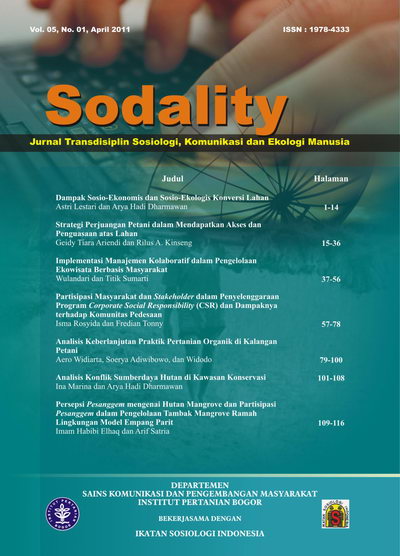ANALISIS KEBERLANJUTAN PRAKTIK PERTANIAN ORGANIK DI KALANGAN PETANI
Abstract
The objectives of this research are: (1) to analyze the influence of organic farming practice to the economic sustainability of farmers; (2) to compare the complexity level of organic farming practice and conventional farming practice based on farmer’s perception; and (3) to investigate causal factors regarding why organic farming practice is not widely adopted by farmers. This research was conducted by using quantitative approach at Ketapang Village, Susukan Subregency, Semarang Regency, Central Java on November-December 2010. The number of respondents in this research was 79 people from the total population target of farmers. The selected respondents determined through stratified random sampling and simple random sampling technique afterwards. The respondents were devided into two groups: experimental group (organic farmers) and control group (conventional farmers). The kinds of data in this research were: primary quantitative data which collected by spreading questionnaire to the respondents; secondary data from Al-Barokah’s document; and also supported with primary qualitative data which gathered from in depth interview technique. The data were analyzed by using Paired Samples T-test and Kolmogorov-Smirnov Test, supported with SPSS Program for Windows Version 17.0. The results of this research show that organic farming practice has significant positive influence to the economic sustainability of farmers. Nevertheless, organic farming practice is considered more complex or difficult significantly than conventional farming practice based on control group’s perception. Conversely, the fact above doesn’t valid for experimental group. There are several causal factors regarding why organic farming practice is not widely adopted by farmers, such as: pragmatic mindset of farmers in viewing organic farming practice and ecological sustainability; farmers are not satisfied if they only use organic fertilizers for rice that make its leaf green color become less visible; organic farming practice doesn’t ensure pest-free; the use of organic fertilizer is more difficult than synthetic fertilizer; and a large part of farmers have inadequate supply of manures. Socio-economic characteristic of farmers consisting of: education level, agricultural land ownership status, and livestock ownership are also revealed as influential factors to the organic farming decision process.
Published
2011-04-06
How to Cite
WidiartaA., AdiwibowoS., & wW. (2011). ANALISIS KEBERLANJUTAN PRAKTIK PERTANIAN ORGANIK DI KALANGAN PETANI. Sodality: Jurnal Sosiologi Pedesaan, 5(1). https://doi.org/10.22500/sodality.v5i1.5831
Issue
Section
Articles
Authors who publish with this journal agree to the following terms:
- Authors retain copyright and grant the journal right of first publication with the work simultaneously licensed under a

This work is licensed under a Creative Commons Attribution 4.0 International License. that allows others to share the work with an acknowledgement of the work's authorship and initial publication in this journal. - Authors are able to enter into separate, additional contractual arrangements for the non-exclusive distribution of the journal's published version of the work (e.g., post it to an institutional repository or publish it in a book), with an acknowledgement of its initial publication in this journal.
- Authors are permitted and encouraged to post their work online (e.g., in institutional repositories or on their website) prior to and during the submission process, as it can lead to productive exchanges, as well as earlier and greater citation of published work (See The Effect of Open Access).





.png)










